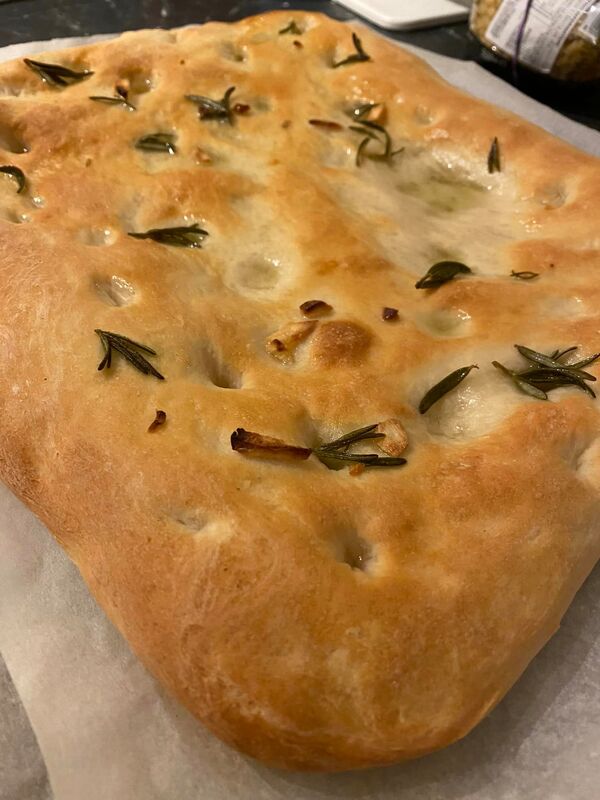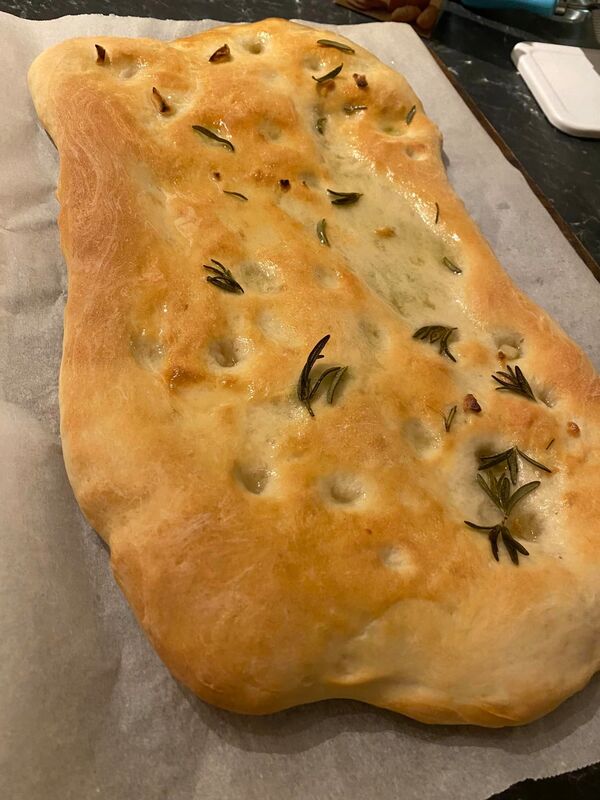Pide Bread
We are on our Eating Around the World Adventure, this time in Turkey, and when cooking Turkish food, one needs to make Pide Bread.
Pide Bread is to the Turkish what focaccia is to the Italians, it's a national treasure, both absolutely delicious breads that you need to try and make. This bread is so easy to make, especially if you have a strong freestanding mixer, but even if you don't have one, it just involves a bit more kneading time by hand. The dough is beautiful, it is so easy to work with. As for the flavour, so much better than the mass produced store bought pide breads.
I served it with Ali Nazik and it was the perfect vessel to scoop up all the delicious sauce.
I like to add flavoured oil to the dough, but that is optional. Don't add too much as it will pool on top when baking, it doesn't soak into the dough. If that happens and you find there is too much oil, just pour it off, the flavour is still there.
Now you can roll the bread out to make it even in thickness, I don't, I just like to stretch it out with my hands and then you get thin bits and thick bits, then your family pick bits that they want.
Bread making is something that is not complicated and everyone should be making at home, here is a great starting recipe, easy and delicious.
Pide Bread is to the Turkish what focaccia is to the Italians, it's a national treasure, both absolutely delicious breads that you need to try and make. This bread is so easy to make, especially if you have a strong freestanding mixer, but even if you don't have one, it just involves a bit more kneading time by hand. The dough is beautiful, it is so easy to work with. As for the flavour, so much better than the mass produced store bought pide breads.
I served it with Ali Nazik and it was the perfect vessel to scoop up all the delicious sauce.
I like to add flavoured oil to the dough, but that is optional. Don't add too much as it will pool on top when baking, it doesn't soak into the dough. If that happens and you find there is too much oil, just pour it off, the flavour is still there.
Now you can roll the bread out to make it even in thickness, I don't, I just like to stretch it out with my hands and then you get thin bits and thick bits, then your family pick bits that they want.
Bread making is something that is not complicated and everyone should be making at home, here is a great starting recipe, easy and delicious.
Recipe
Recipe adapted from Rick Stein's cookbook 'From Venice to Istanbul'
Makes 2 Pide Bread
10g dried active yeast
1 teaspoon caster sugar
450ml lukewarm tap water
700g white bread flour, plus extra for dusting, if needed
1½ teaspoons salt
1 tablespoon olive oil
1 tablespoon semolina or polenta, for dusting
For the topping:
1 clove garlic, finely chopped
50ml olive oil
1 sprig rosemary, leaves detached
1 teaspoon flaky sea salt
Makes 2 Pide Bread
10g dried active yeast
1 teaspoon caster sugar
450ml lukewarm tap water
700g white bread flour, plus extra for dusting, if needed
1½ teaspoons salt
1 tablespoon olive oil
1 tablespoon semolina or polenta, for dusting
For the topping:
1 clove garlic, finely chopped
50ml olive oil
1 sprig rosemary, leaves detached
1 teaspoon flaky sea salt
Combine the yeast, sugar and lukewarm water in a jug and leave in a warm place until it froths.
In a large bowl of a freestanding mixer (or just a normal bowl if making by hand), mix the flour and salt, then add the oil, mix, now add in the yeast mixture. Bring together into a dough and knead by hand for 10 minutes (or 5 minutes in a mixer with the dough hook attachment on low speed) until smooth and elastic. Place the ball of dough in an oiled bowl, turn the dough around so it is lightly coated in the oil, cover with cling film and a tea towel and leave to rise for about an hour or until doubled in size.
In a large bowl of a freestanding mixer (or just a normal bowl if making by hand), mix the flour and salt, then add the oil, mix, now add in the yeast mixture. Bring together into a dough and knead by hand for 10 minutes (or 5 minutes in a mixer with the dough hook attachment on low speed) until smooth and elastic. Place the ball of dough in an oiled bowl, turn the dough around so it is lightly coated in the oil, cover with cling film and a tea towel and leave to rise for about an hour or until doubled in size.
While the dough is rising, combine the garlic and olive oil in a pan and warm through, then turn off the heat and leave to infuse. When cooled, add the rosemary leaves and set aside.
Knock back the dough when ready on a floured surface (add flour only if the dough feels sticky) and divide the dough in two even pieces. Cover and leave to rest for a further 15 minutes.
Heat the oven to 240C/220C fan forced, and heat 2 baking trays. I use one baking tray and tend to bake them one by one, saves washing up and for my family by the time we have eaten the first one, the second one is baked and hot, but it's good to know you can bake both at once if you need to.
Heat the oven to 240C/220C fan forced, and heat 2 baking trays. I use one baking tray and tend to bake them one by one, saves washing up and for my family by the time we have eaten the first one, the second one is baked and hot, but it's good to know you can bake both at once if you need to.
Flatten the dough balls into large ovals (or whatever shape happens in my case) with your hands or a rolling pin.
Dust two sheets of baking paper with semolina or polenta (I prefer semolina), then place the dough on them. Make indentations with your fingers all over the surface of each and drizzle over the infused oil with rosemary. Sprinkle over the flaky salt.
Bake for 10-12 minutes or until golden. Allow to cool a little, but eat while still warm.
Dust two sheets of baking paper with semolina or polenta (I prefer semolina), then place the dough on them. Make indentations with your fingers all over the surface of each and drizzle over the infused oil with rosemary. Sprinkle over the flaky salt.
Bake for 10-12 minutes or until golden. Allow to cool a little, but eat while still warm.
Enjoy!

